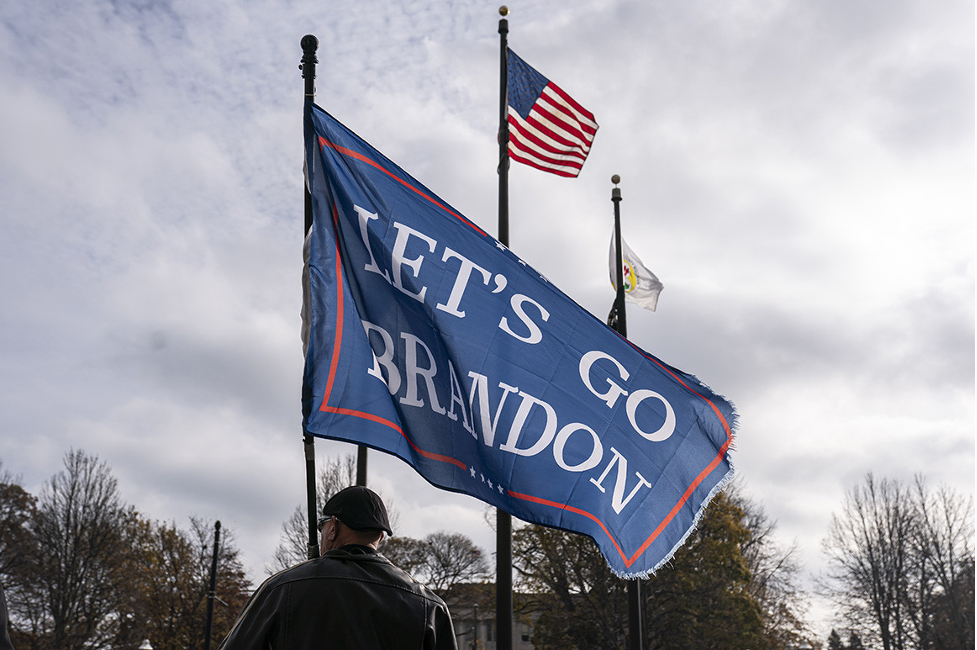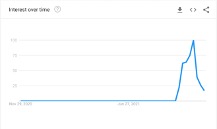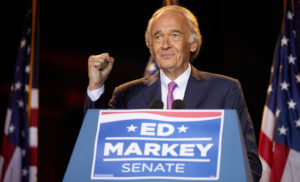
“Let’s go, Brandon” is a hard slogan to miss these days. Trending frequently on Twitter, it has become a rallying cry of sorts for Republicans who wish to proclaim “F*** Joe Biden!”. The phrase originated in early October at a NASCAR race in which driver Brandon Brown claimed a victory. Fans in the stand were chanting “f*** Joe Biden” as Brown was interviewed by a reporter who misheard the chant as “Let’s go, Brandon”. The phrase erupted in Right-wing circles.
From October 2nd, onward, the phrase spiked dramatically in web searches, peaking in early November. The slogan popped up at Republican rallies and on signs, stickers, shirts, and flags around the country. Members of the House of Representatives were spotted wearing masks bearing the phrase on the House floor and Senator Ted Cruz chanted the phrase at a baseball game. Yet there is a flaw in this phrase that has irked me. The “Brandon” slogans really aren’t that funny or smart at all. “Let’s go, Brandon” is not clever, the logic of the joke really falls flat, its main quality is that it holds the power of an inside joke.
It wasn’t long before Biden supporters took issue with this chant, eventually coining the equally dull “Thank you, Brandon” to express gratitude for the Biden administration. Such slogans harken back to elementary school, where one might scream “frick you” as a means to coyly, but not really coyly, disrespect a playground nemesis.

This is not the first phrase that is being portrayed as smug and clever without any real merit. Liberal late-night shows and Twitter personalities during the Trump Presidency played a similarly cheap game. Jokes grasping at straws calling Trump “Drumpf” or laughing at “covfefe” were all the rage during the Trump era, an easy way to get laughs and likes despite their lack of creativity. Even late-night host John Oliver said that “Drumpf” “became old for us very quickly. There’s a reason we didn’t use it again.” The common factor among these phrases is that there is a specific video or tweet the audience has to have seen in order to understand its significance and laugh about it. Clips of Oliver explaining that Trump’s family name was originally Drumpf, or the infamous “covfefe” tweet, like the “Let’s go, Brandon” moment are widely available and, in watching them, audience members become in on the joke as they know the root of it.
There is also money to be made with such phrases. In the same way one can purchase a t-shirt repping an underground band to showcase their taste and hopefully make a connection with another fan, wearing a shirt with a phrase like “Friend of the Pod” that only certain people with specific political beliefs will enjoy is appealing and lucrative. The Trump campaign began selling “Let’s go, Brandon” shirts in late October to anyone who donated $45 or more, capitalizing on Republican enthusiasm.
In an increasingly isolated and divided country, community is hard to come by. Perhaps “Let’s go, Brandon” has taken off at this moment because the Right finds itself the “outsider” in American politics, the same way the Left did during the Trump Presidency. Rallying around things that only your group “gets” is empowering, to see these phrases gain traction with millions of people online demonstrates how deeply intertwined the media, the internet, and partisan politics have become. Such phrases are tribal, and, yes, immature, but they are also indicative of our time and of human nature. While these inside jokes are simplistic, and really not that inside at all, they reflect the independent streak that runs through American life to resist a perceived oppressive government, together, even if that form of resistance is really quite lame.



